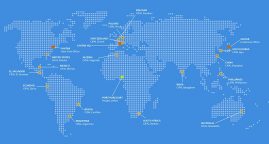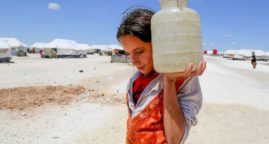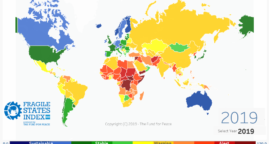Health crisis looms on Puerto Rico in the aftermath of Hurricane Maria
Article published on the Sovereign Order of Malta website on 12/28/2017
Malteser International and the Order’s delegation joint efforts
Four months after Hurricane Maria laid waste to large parts of Puerto Rico, huge numbers of people continue to suffer under the lingering effects of the storm, the most intense tropical cyclone worldwide recorded so far in 2017. Amongst the worst affected are the towns of Humacao in the South East, and Guaynabo in the North East of the island. Many houses have been flooded or had their roofs torn off. The simple corrugated huts that are home to many of the poorest have been completely destroyed. There is a desperate shortage of shelter – and supplies of clean water, food, and medication are running low: “The people here urgently need more help in order to prevent the spread of disease,” said Ravi Tripptrap, Executive Director of Malteser International Americas, the Order of Malta’s international relief service in the Americas. “We can see how the situation is getting worse day by day.”
Numerous cases of tropical diseases such as Zika, Dengue, and Chikuyunga Fever have been registered since the beginning of the disaster. “If these illnesses continue to spread, Puerto Rico is set to face a huge health crisis,” warned Tripptrap.
To prevent health issues and epidemic outbreaks, Malteser International Americas is focusing recovery efforts on improving water, sanitation, and hygiene conditions for the most affected communities still without access to clean water, as this is the most urgent identified need to prevent further crises.
The local delegation of the Order of Malta has been providing assistance to the people affected in Humacao and Guynabo since mid-October. Around 20,000 warm meals, over 8,000 food packets, and more than 21,000 bottles of drinking water have been distributed since then, while weekly consultations with doctors have been provided. Aid activities are centered around two distribution stations based on land owned by local parishes.
Related Articles
UNITAR and OHCHR Set the Stage for More Satellite to Protect Human Rights
“This technology is very important for the work we do. UNOSAT analysis can prove very useful in complementing the various forms of human rights investigations”. OHCHR’s Deputy High Commissioner Flavia Pansieri.
OCHA report : 2017 Humanitarian Response Plan End of Year Report (January – December 2017)
December 2017. Humanitarian needs remain staggering in terms of scale, severity and complexity.
Tipping points 2019 | Lessons from fragility
04/10/2019. You can probably guess the country ranked “most fragile” on the 2019 Fragile States Index (FSI) produced by Fund for Peace, a Washington-based think tank.






